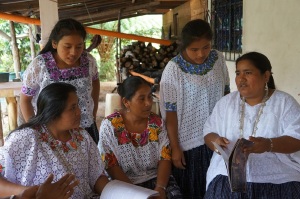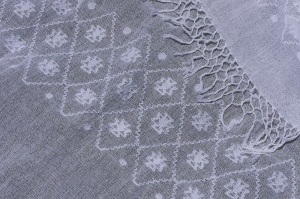Amalia Güe lives in the village of Samac, in the mountains of Alta Verapaz, Guatemala. It’s a long way from Santa Fe, New Mexico. But if she walks for awhile, then takes a series of buses and airplanes, then more buses, she can get from home to Santa Fe in two days. There Amalia represents the group of weavers she works with, Group of Women, Goddess of the Moon, at the International Folk Art Market, selling their rare and beautiful textiles to people eager to enjoy traditional textiles from all over the world. This past July (2015), in addition to all the other benefits of being there, Amalia was the first of the artisans in Traditional Weavers of Guatemala – Their Stories, Their Lives, to receive her own copy of the book. I was not there, but Linda Ligon told me that she took it and shyly hid it away, saving it to explore back in her hotel room. I was there, however, when my friend and co-author Teresa Cordón and I delivered her second copy to her at her home in Samac.

When we arrived there were three other women from the group, as well as some of Amalia’s children coming and going. Amalia had not shown them the book, keeping it for this special occasion. The three women spoke varying degrees of Spanish, clearly more comfortable in their native Q’eqchi’. They paged through the book, intent on the pictures of the other artisans as much as those of their own. And then Amalia began to cry. “I’m sad,” she said. Surprised, we asked why. “I never thought we would be in a book like this.” “So you are happy?” asked Tere. It turned out that while clearly Amalia was touched and crying tears of joy, she did not have the Spanish vocabulary to say that. For her, tears represented sadness; she did not have the linguistic finesse to talk of happy tears. But she was indeed very happy, and proud of the group and all their work. They are struggling so hard to preserve the pijbil weaving, a lightweight inlay woven completely with single-ply cotton, and for that they need international sales. Happily, they do sell their work in the U.S. through Cloth Roads. Amalia wondered if we knew of any other fairs like the one in Santa Fe in other countries. She had been to one in Mexico, had heard about one in Japan. She also wondered if there was a visa that would allow her to go everywhere in the world.

For their part, the other women expressed repeatedly how grateful they were to Amalia, who has kept the group together and taken on the monumental task of going far away to make sales for them. They have some sales within Guatemala, but need those from outside to be able to keep weaving, the wish of the sixty weavers of Goddess of the Moon. Whereas Amalia clearly loves the travel, the other women showed no such inclination. One of the big values of being able to support their families weaving is that it allows the women to work at home, where they are safe and can care for their children. That Amalia was willing and able to go – that is for them a huge gift.
If you want to know more about Amalia and the women of Goddess of the Moon, look for Traditional Weavers of Guatemala – Their Stories, Their Lives, at Cloth Roads or Mayan Hands or even Amazon.
It will be fun to follow Amalia and the others into the future!
LikeLike
Your stories are heart moving…feel like we are actually meeting these amazing women!
LikeLike